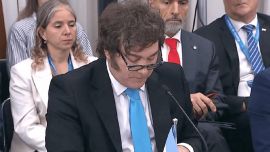Sunday, October 27, 2019 might well be the first day of the rest of Alberto Ángel Fernández’s life, though last May 18 could equally qualify for that milestone – that was the date when Cristina Fernández de Kirchner turned Argentine politics on its head by inverting the Peronist presidential ticket, taking second place behind her former Cabinet chief. The question is, is she the one calling the shots?
In retrospect, it looks as if from that moment on, tomorrow’s election was Alberto Fernández’s to lose, given a reunited Peronism and a faltering economy. Even if the key figure of Sergio Massa (with a kingmaking 21.4 percent of the votes from his 2015 presidential candidacy) was not to climb aboard the Frente de Todos train for another month, the sight of such an acid critic of the ex-president teaming up with his former target was already serving to disarm his numerous fellow-critics among a hitherto fragmented Peronism.
Prior to the Alberto Fernández presidential candidacy, support for Cristina Fernández de Kirchner had been the exception rather than the rule among Peronist governors with memories of her highly centralist presidency too strong for more than three or four to desire her return – replacing her at the top of the ticket transformed this reluctance into virtual unanimity while also giving the new candidate powerful allies to balance the infinitely greater electoral clout of his running-mate.
Within Argentina, Fernández served to broaden the appeal of Peronism beyond the strident leftist populism represented by his running-mate, while also deflecting her high negative ratings which exceeded her strong opinion poll performances. Beyond Argentina it was also thought that the markets would be less spooked because of his more pragmatic approach to economic issues.
This dramatic move changing the paradigm of polarisation between the current and former presidents would seem to place Fernández in the role of outsider, except that he is the supreme insider – a veteran political operator who was already widely seen as the power behind the throne of the expresident’s ambitions ever since their reconciliation (starting with a secret meeting 15 months before the definition of the ticket). Until that is, he ended up aspiring to the throne itself.
Just seven weeks younger than the man he is seeking to replace, Fernández was born in this city on April 2, 1959, growing up in the Argentinos Juniors part of town (ViIla del Parque) which defined his football loyalties ever since. In his teens he strummed a guitar with his idol Lito Nebbia, a favourite pastime persisting to this day, but a legal career was marked out for him from the start by his two fathers – both the biological progenitor, a City magistrate, and the national judge Carlos Pelagio Galíndez, with whom his mother remarried early in his life and whom he considered his true parent.
The marital instability of his parents was inherited – he has never remarried since his 2006 divorce from his first marriage (one son Estanislao, 24, also known as Dyhzy, is known for being a drag queen) with a string of girlfriends ever since, of whom the most politically prominent was ex-senator Vilma Ibarra, the sister of 2000-2006 City Mayor Aníbal Ibarra. His current partner (since 2014) is actor/journalist Fabiola Yáñez.
Graduating in law from the University of Buenos Aires in 1983, the year of Argentina’s return to democracy, Fernández has lectured in criminal and civil law as a UBA professor to this day but his entry into politics preceded both his graduation and the elections. Today’s mainstream pragmatist started out on the fringe with Alberto Asseff’s tiny right-wing Nationalist Constitutional Party (which in more recent years has been linked to the Rodríguez Saás of San Luis) – the opposite end of the political spectrum to his running-mate – but that same year saw him joining the Justicialist Party (PJ).
Neither of these parties formed part of the first democratic administration headed by Radical Raúl Alfonsín but Fernández was not one to let that little detail keep him out of the corridors of power for long. In 1985 he joined the Economy Ministry’s legal department as its deputy head, continuing in the ministry after Peronist Carlos Menem’s victory in 1989 but switching posts to Insurance Superintendent. There he developed a close relationship with Menem’s economic czar Domingo Cavallo (a champion of privatisation and deregulation, ideas fully shared by Fernández at that time), resigning with him in 1995. Various graft allegations surfaced in that period but were never formalised.
His alignment with Cavallo continued into the 21st century, leading to the only elected post of his career so far – in 2000 he entered the Buenos Aires City Legislature in the 11th slot of a list headed by the mayoral ticket of Cavallo and Gustavo Beliz. But he was already seeking new horizons – in 1998 he had been a founding member of the Calafate Group, originally formed to frustrate Menem’s “re-re-election” obsession but eventually becoming the springboard for the presidential ambitions of Santa Cruz Peronist Governor Néstor Kirchner, ambitions crowned with success in the 2003 election when Fernández was campaign manager.
From campaign manager to Cabinet chief was a logical enough progression and Fernández served in that capacity throughout Néstor Kirchner’s term before being inherited by his current running-mate. There his first priority was to construct a power base well beyond Kirchner’s modest 2003 vote of 22 percent, coining the phrase “transversal y superadora” for his method – impossible to translate into English but boiling down to raiding other parties (which leads to suspicions he might go cherry-picking among Juntos por el Cambio leaders if he wins tomorrow). Among others he recruited most Radical governors, including Mendoza’s Julio Cobos, who became Cristina Fernández de Kirchner’s 2007 running-mate – only to scupper her grain export duties bill in 2008, a political debacle which also led to the exit of Fernández, ending five years of quasi-premiership.
In the ensuing decade he was increasingly critical of his former boss, often drawing a contrast between “good” Kirchnerism as practised by Néstor Kirchner (especially after the latter’s death in 2010) and the “bad” Kirchnerism of his widow.
This estrangement led him to join Massa (his successor as Cabinet chief, also co-existing with Cristina Kirchner for less than a year) in 2013, acting as the campaign manager of Massa’s 2015 Renewal Front presidential campaign. In the 2017 midterms he performed similar services for Justicialist senatorial candidate Florencio Randazzo, always in opposition to his current running-mate.
Until that secret meeting 20 months ago, just 10 days before Cristina Fernández de Kirchner’s 65th birthday – a reconciliation which climaxed three months later at the Book Fair presentation of Sinceramente, when the ex-president singled out her new guru (seated in the front row) as the inspiration of her magnum opus. Just a fortnight before that historic May 18.
Should Alberto Fernández be strumming his guitar today (as he likes to do in any spare moment), who knows if he might not choose to accompany it with that Cabaret song, “Tomorrow belongs to me”?





















Comments